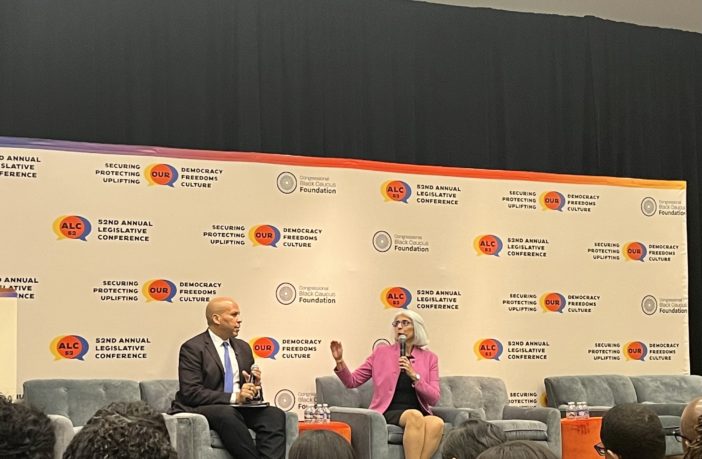By Megan Sayles,
AFRO Business Writer,
msayles@afro.com
On its face, artificial intelligence (AI) may seem obscure and dubious, but it’s already revolutionizing daily life across the globe. Given its power to mimic human decision-making, many are asking questions about its potential to advance or set back equity.
This was the central concern of a panel led by Sen. Cory Booker (D-NJ) on Sept. 20, during the Congressional Black Caucus Foundation’s Annual Legislative Conference. Experts weighed in on how to reduce AI’s risks while capitalizing on its promise.
“AI is going to touch every community on the planet Earth and every aspect of our nation from our health care, to our education, to energy, to the way that the government does business. It’s going to be affected by AI,” said Booker. “If you are not at the table, you might end up on the menu. More importantly, AI— at its best— could have an incredible democratizing ability for our society, further leveling playing fields and opening up advantage.”
As part of the discussion, Booker spoke with Arati Prabhakar, director of the White House Office of Science and Technology Policy, to learn more about the Biden-Harris administration’s strategy for AI.
“Every country around the world is racing to use AI to build a future that reflects their own values, and that’s what’s at stake. I think everyone here is very clear that we don’t want to live in a world driven by technology that’s shaped by authoritarian regimes,” said Prabhakar. “Our job is to step up to the plate and make sure we build a future using this powerful tool—one that reflects our values.”
Much of the concern about AI revolves around algorithm bias. The technology requires data from humans to function. If the data sets include humans’ innate biases or are not representative of the country’s population, AI can, in turn, perpetuate bias.
“I actually think if used intelligently, carefully and responsibly AI can be one of the most powerful tools to help us figure out when there are problems and what to do about them,” said Prabhakar.
According to Britannica, “artificial intelligence (AI)” is “the ability of a digital computer or computer-controlled robot to perform tasks commonly associated with intelligent beings. The term is frequently applied to the project of developing systems endowed with the intellectual processes characteristic of humans, such as the ability to reason, discover meaning, generalize, or learn from past experience.” (Photo courtesy of Unsplash / Possessed Photography)
She highlighted President Biden’s recent announcement that an executive order is being developed to guide the use of AI in the public and private sectors. She also touched on the administration’s AI Bill of Rights, which was created last year.
“It says Americans have the right to have AI that is safe, secure, does not discriminate, does not violate privacy and that supports and reinforces civil rights and civil liberties,” said Prabhakar.
Thus far, the White House has secured voluntary commitments regarding the safe, transparent and equitable use of AI from 15 leading technology companies, including Amazon, Microsoft, Meta and Adobe.
Sanmi Koyejo, president of Black in AI and computer science professor at Stanford University, discussed how AI can accelerate workplace productivity and create positive economic impact during the panel.
“In my work, we look a lot at AI for medicine, and it’s shown lots of great opportunities for accelerating diagnoses, [like]diabetes and lots of other disorders, which impact millions and millions of people,” said Koyejo.
He also explained how AI can be used in education.
“You can engage with the technology, and it can come up with ways to interact with you that match how you like to think about the world and how you like to learn,” said Koyejo. “I think this increases the potential to have real impacts on reducing gaps in education and learning.”
He encouraged African Americans to refrain from avoiding or ignoring AI, particularly because its ethical operation depends on human input.
“We should engage with this technology,” Koyejo said. “It matters that we’re in the conversation, and it matters that we’re in rooms where AI technology is being built and where decisions are being made about how it’s constructed.”
Megan Sayles is a Report for America Corps member.



